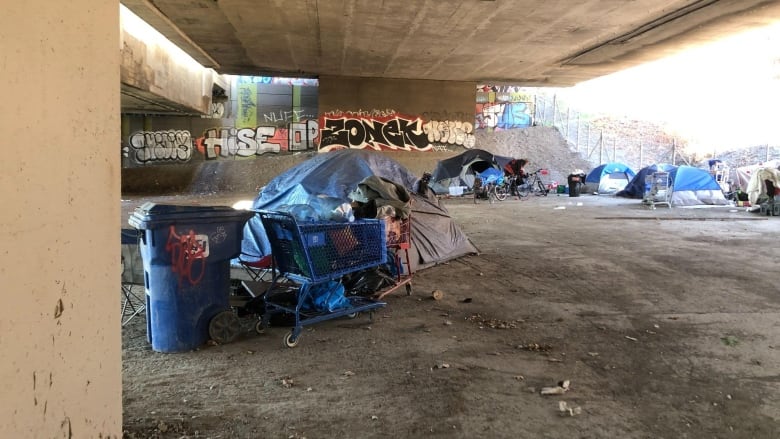Tent community under Ville-Marie Expressway in Montreal must go by June 15, judge orders
Judge says resources are available for those living under highway overpass

A judge has ordered the dismantlementof a homeless encampment under the Ville-Marie Expressway in Montreal.
Quebec Superior Court Judge Pierre Nolet said in a decision delivered on Tuesdaythat the encampment willbe dismantled afterJune 15 to allow for maintenance work on the structure that supports the highway.
"The Montreal region has already witnessed the disastrous consequences of not taking proper care of road infrastructures," he wrote. "In addition to the economic consequences, there are human consequences at stake. They cannot be ignored."
Nolet refused to renew an injunction that haddelayed the eviction of the people living in the camp. That injunction was issued to make time for the Quebec government to find accommodations for the 20 or so people living under the highway.
In his decision, Noletacknowledged that the community living under the highway may be in greater danger once they are evicted.
But he said there are resources available for them beds in homeless shelters, for example which they are choosing to ignore.
In the meantime, they are occupying a space that is not available to the public, like a park would be, and are living where they are not allowed to be, Nolet wrote.
The injunction that had allowed the camp to stay put temporarily was renewed in April by the Superior Court to give the government time to provide resources and shelter to the camp residents.
David Chapman, executive director of the day shelter Resilience Montreal, said at the time that many of those living under the overpass would likely not be welcome in overnight shelters.
For example, Chapman said, some of them live with a partner, a pet or struggle with addiction. Many shelters only allow people of the same gender, have a ban on pets and don't allow alcohol or drug use.
"While it's not ideal that you have a camp under the bridge when there's a community and there's people, for example, who have Naloxone in the community, there is a measure of safety," said Chapman.
"The problem with scattering the group is that then we don't know where to find them. And should they be in a situation where they overdose, the probability is higher that there will be nobody there to help."












_(720p).jpg)


 OFFICIAL HD MUSIC VIDEO.jpg)
.jpg)



























































































